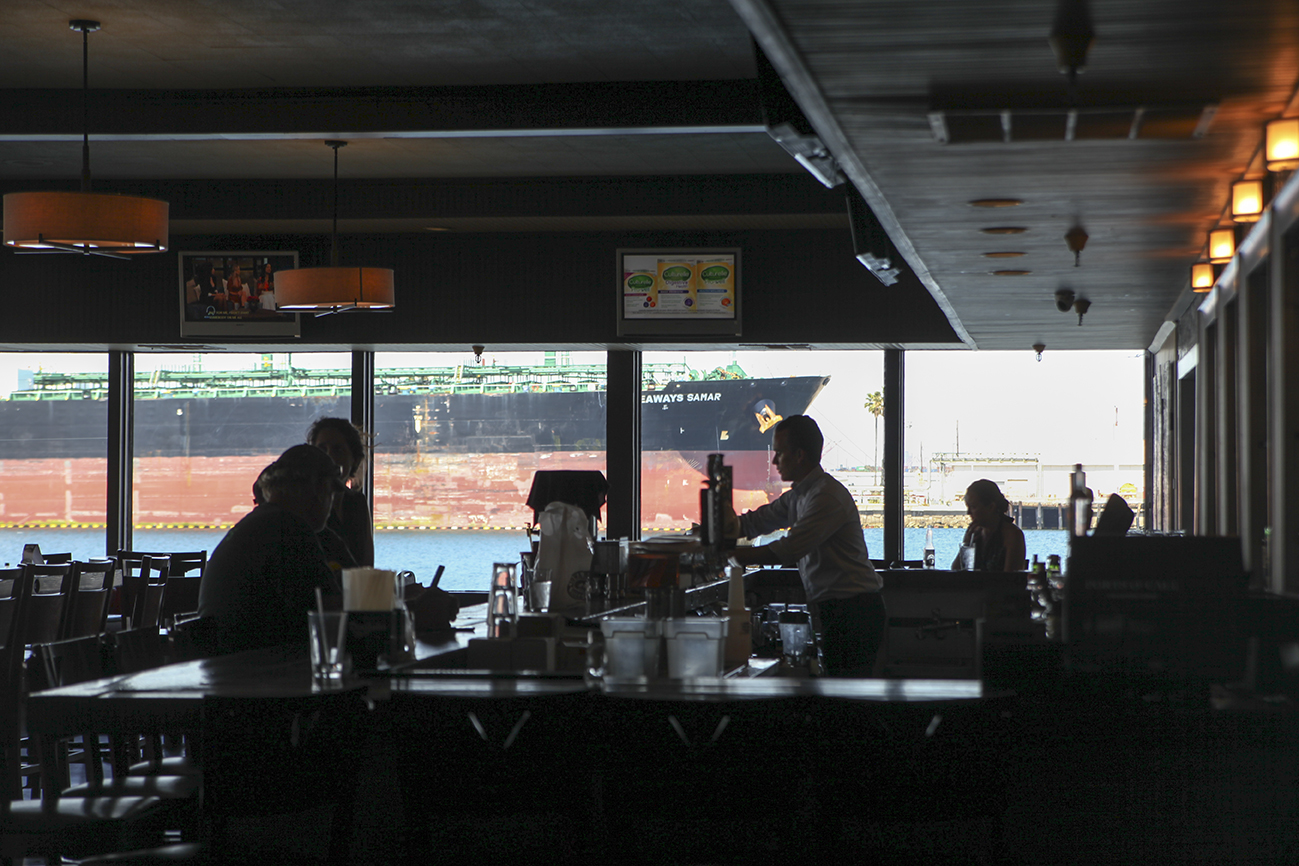[dropcap size=big]A[/dropcap] small-framed black Cuban man is pedaling a red rickshaw bumping Vicente Fernández with a little brown dog in tow on a scorching hot Friday afternoon. There is a group of norteño busking musicians leaving the seaside deck they grew up on. From a table covered in white cloth and adorned with empty wine glasses, a lone woman sits with a view of a massive red-and-black barge the size of a football field — and one last frosty glass of 805.
These are just a few of the not-so-subtle reminders that the Ports O’Call Village in San Pedro is more than simply a Los Angeles landmark facing redevelopment.
The waterfront dining attraction is also a story about the fabric of Los Angeles. The South Bay neighborhood’s former prime jewel is woven together by working-class Latinos, Asians, African Americans and Anglos, a commercial community meant to provide an under-sung home for quality food and entertainment for generations of Southern Californians.
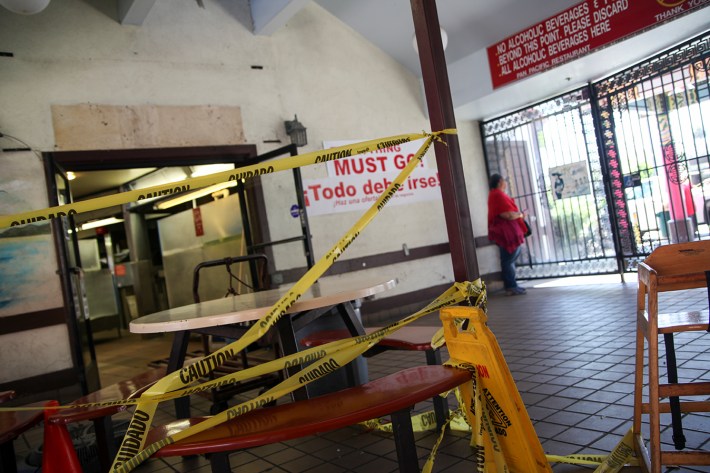
Sadly, it’s a story that is slated soon to end, with at least 100 people losing their jobs, according to Wyatt Wilson, the Ports O’Call restaurant manager and co-owner.
“I just checked and we have exactly 100 employees, most of whom will probably have to retire,” Wilson said in an interview with L.A. Taco, as he stood in the middle of his beloved waterfront eatery.
The 57-year-old restaurant is on the verge of closing its doors for good after exhausting its legal efforts last month, when a Los Angeles Superior Court judge ruled in favor of the city’s right to evict.
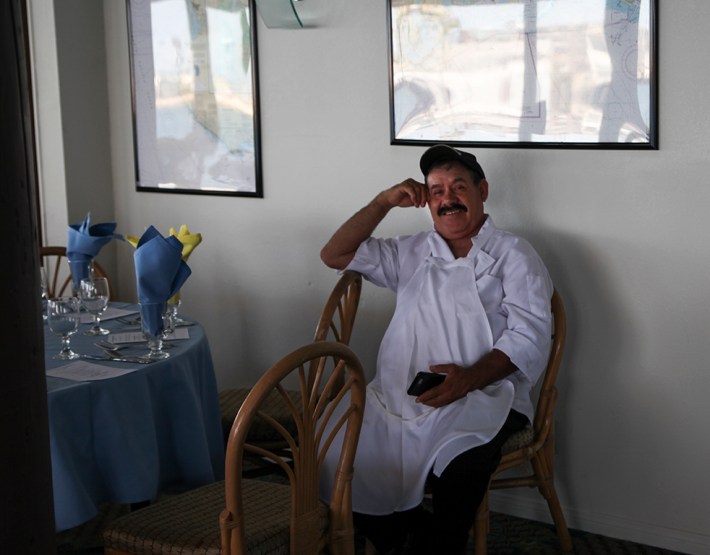
[dropcap size=big]T[/dropcap]he fine dining establishment is the original cornerstone of the Ports O’Call Village, a collection of seafood restaurants and attractions on the Port of Los Angeles that got its start in 1961 when World War II vet David Tallichet opened Ports O’ Call, then as a Polynesian-themed diner.
Wilson said the city’s plan is to knock the old village down and build a development, to be named “San Pedro Public Market,” a new collection of restaurants, department stores, office spaces, and an amphitheater. While the similarly named San Pedro Fish Market, and a few other village spots, will remain open until they can move to the new Market, Ports O’Call will still have to be demolished so that the new market can be built.
“As far as I understand it, the developer chooses who gets to stay and we weren’t chosen,” Wilson explained. “It does feel a little like we are being picked on and we’re not quite sure why.”
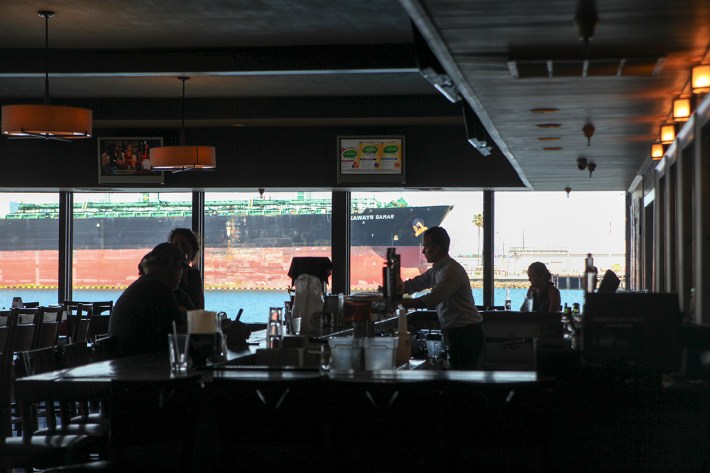
Barring a last minute reprieve, Ports O’Call Restaurant now faces the eviction and bulldozers at any moment, while others like the Alaska Seafood Restaurant and the Pan-Pacific Restaurant on the far side of the village spent the Friday tearing down and gutting the kitchens — a day after their last dinner service.
“Business was very good up until the end,” Pan-Pacific manager Sam Kim told L.A. Taco, as his staff spent its final day together dismantling the massive stove and throwing up caution tape. Kim said he didn’t have another job lined up yet, but that a few of his 12 remaining employees had secured new gigs.
Across the hall and under its own layers of yellow caution tape, a tall Asian man came running out of Alaska Seafood pleading repeatedly with L.A. Taco to leave the premises. “Please! Please! Please! Leave! It is very dangerous!”
Indeed, the once thriving corner of the Ports O’Call village is now what one might call a crime scene of gentrification.
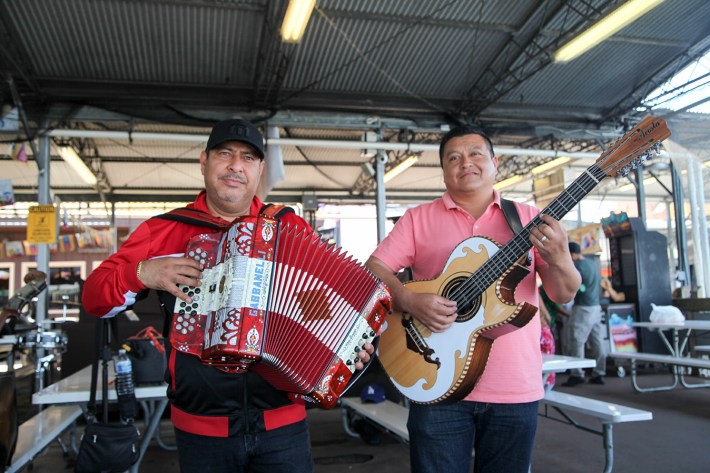
[dropcap size=big]I[/dropcap]In 1963, Tallichet, a born and bred Texan, started building his vision for the village as an international destination of themed restaurants, gift shops, and live music connected by cobblestones and fueled by trade along the harbor. Plenty of other ports or bays along the coast of California have similar establishments or boardwalks.
In San Pedro, visitors still filtered about. Chuck Villarreal, a retired electrician, said his family had been coming to Ports O’ Call since it opened.
“My father left for the service from this harbor,” Villarreal recalled staring over the chain-link fence that covers the razed portion of the village. “We used to come here like everyday, look at it now. It’s a bummer.”
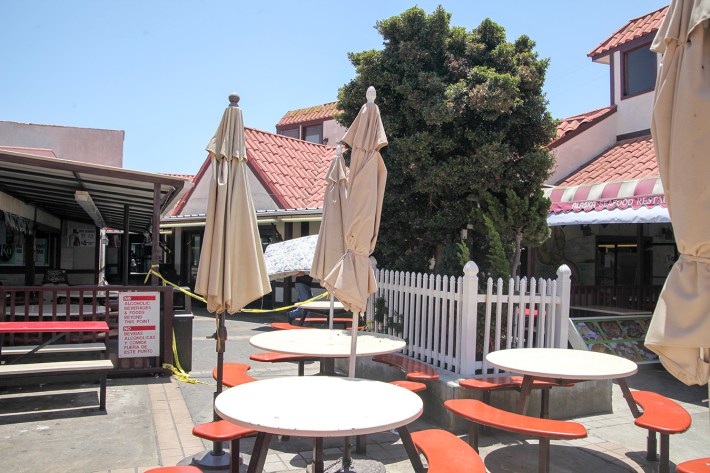
Villarreal remembers catching fish and crabs right under the village. He also remembers the explosion of the SS Sansinena. “I felt the ground shake and I look up over my mom’s roof and this mushroom fire just rose up. Man, I’ll never forget it,” Villarreal recalled with a look of horror in his eye. “Everyone thought we were under attack.”
The fuel tanker sitting just outside the harbor suffered from a freak build-up of hydrocarbon vapor, causing it to blow up and sending thousands of pounds of shrapnel flying for miles. The incident killed nine people and injuring 46.
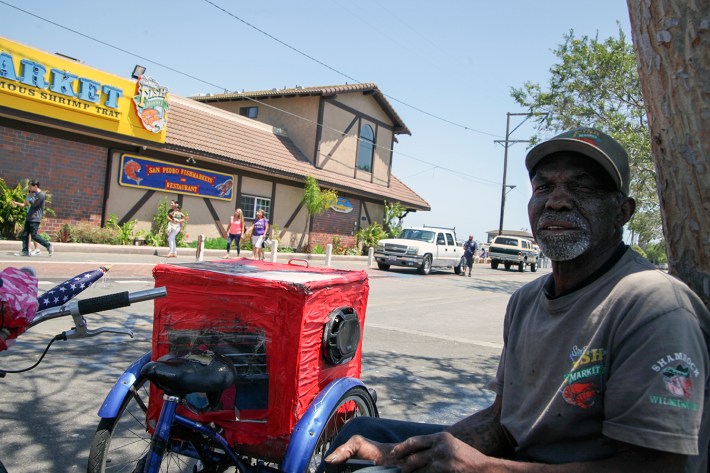
But the explosion did little to temper the growth of business at the port or the village, according to Gilberto Caldera.
Caldera, a Mexican immigrant from Zacatecas, said Ports O’ Call has been thriving as long as he’s been around. Caldera began working in the village kitchens in the early 70s, climbing his way to a white coat as a line cook for Ports O’Call Restaurant, where he’s been since 1974.
[dropcap size=big]J[/dropcap]ose Nuñez Lopez, the Afro-Cubano who rides the musical rickshaw, said Ports O’Call saved him. He had been a professional boxer after fleeing Cuba in the late 70s.
“I fought eight times,” Lopez recalled, while taking a break from the heat under a tree. “Lost them all. Became an alcoholic and wound up on the streets. But now I’m here bringing the gift of music to the people.”
By the mid 80s, the themed restaurants had transformed into serious seafood joints, attracting tourists and locals alike with buckets of beers, seafood platters and live mariachi music played right at the boardwalk dining tables.
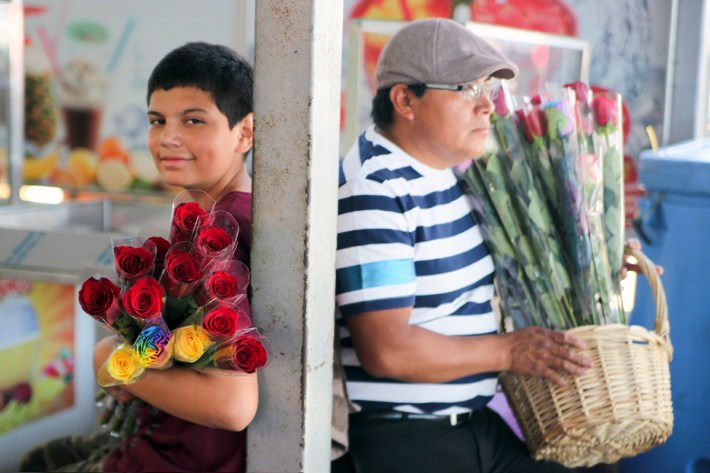
Enrique Mujica, a village musician from Mexico City, was tuning a stand-up bass when he ran into a couple of kids he saw grow up during that time, and eventually marry, who were now visiting with their own children. “It’s amazing to see the generations of people who continue to come here,” he said.
Mujica migrated to San Pedro in 1983 to play music with his father. They played through Reaganomics, the Gulf War, Pete Wilson, Bush Sr. and Clinton, watching as the village became more and more Latino.
Now his Mexican norteño cover band is made up of his three nephews. “Everything changes. It’s part of evolution,” he surmised, adding almost in passing that he and the other permit-carrying musicians of Ports O’Call expect to keep working through construction and at the new development once it opens.
“No one has really told us anything,” he said. “But it’s going to be OK.”
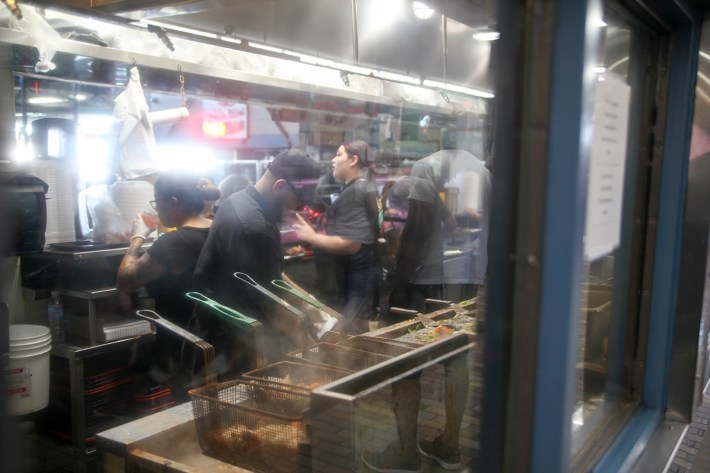
[dropcap size=big]M[/dropcap]aricruz Robledo-Burney, a native of Norwalk, grew up coming every other weekend to Ports O’Call with her father through most of the aughts. On a recent evening, she was visiting from North Carolina with her husband, her old man, and her younger siblings, little boys running circles around dad.
“I would love to walk down here and visit the artisanal shops and we didn’t know actually that it had closed down,” she told L.A. Taco after walking to the doors of Ports O’Call Restaurant. “It’s sad. I mean it’s cool because you’re getting something new but it’s sad because this type of development always displaces a certain type of people.”
Inside the restaurant, in an elegant room deep toward the back of the restaurant where the views of the Pacific Ocean are even more stunning, sat Caldera, the line cook from Zacatecas, surrounded by three of his kitchen compatriots, all dressed in the white coats they’d earned through decades of running the kitchen. They were taking a 15-minute break over coffee and joking about how they have no contingency plan.
“We’re basically going to keep coming to work until we see the padlock and the notice from the sheriff on the door,” Caldera laughed.
His colleagues all added their own version of the end, laughing as a small yacht sped off in the distance.
ALSO BY THE AUTHOR:
‘Black Panther’ and ‘Coco’ Prove Diversity Is Good for Movie Business, Panel Says
How a 'Lil Libros' on Selena Quintanilla Shot to the Top of Amazon's Best Seller List
This Viral Donut Shop in Downey Is Doing Bionico, Mazapan, and Selena-Inspired Donuts
